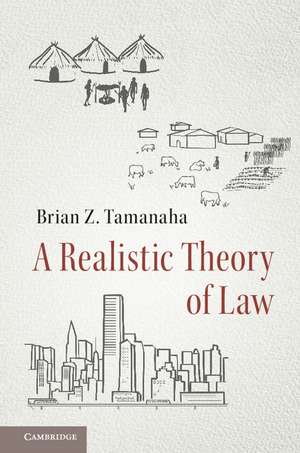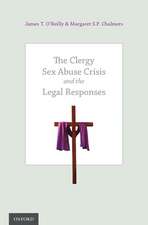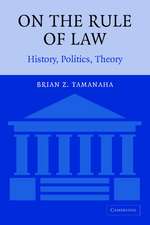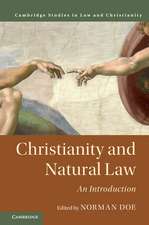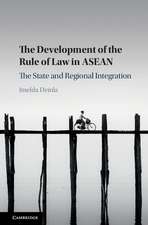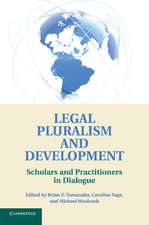A Realistic Theory of Law
Autor Brian Z. Tamanahaen Limba Engleză Paperback – 25 mai 2017
| Toate formatele și edițiile | Preț | Express |
|---|---|---|
| Paperback (1) | 264.31 lei 6-8 săpt. | |
| Cambridge University Press – 25 mai 2017 | 264.31 lei 6-8 săpt. | |
| Hardback (1) | 759.54 lei 6-8 săpt. | |
| Cambridge University Press – 23 apr 2017 | 759.54 lei 6-8 săpt. |
Preț: 264.31 lei
Nou
Puncte Express: 396
Preț estimativ în valută:
50.58€ • 54.92$ • 42.49£
50.58€ • 54.92$ • 42.49£
Carte tipărită la comandă
Livrare economică 22 aprilie-06 mai
Preluare comenzi: 021 569.72.76
Specificații
ISBN-13: 9781316638514
ISBN-10: 1316638510
Pagini: 208
Dimensiuni: 158 x 232 x 15 mm
Greutate: 0.32 kg
Editura: Cambridge University Press
Colecția Cambridge University Press
Locul publicării:New York, United States
ISBN-10: 1316638510
Pagini: 208
Dimensiuni: 158 x 232 x 15 mm
Greutate: 0.32 kg
Editura: Cambridge University Press
Colecția Cambridge University Press
Locul publicării:New York, United States
Cuprins
Introduction; 1. The third branch of jurisprudence; 2. What is law?; 3. Necessary and universal truths about law?; 4. A genealogical view of law; 5. Law in the age of organizations; 6. What is international law?; Conclusion: a realistic theory of law.
Recenzii
'This book displays Tamanaha's strengths: it is thoughtful, grounded on broad scholarship, written clearly, argued well, and offers a fair portrayal of contrary views. … This is a very good and very important work. It is learned, clear, and provocative - in the best sense of that word.' Brian H. Bix, Frederick W. Thomas Professor of Law and Philosophy, University of Minnesota
'Tamanaha has written a book which will revive socio-legal theory and, in particular, will re-introduce historical jurisprudence as a key dimension for any social theory of law. This is a timely and important book, and promises to make a contribution to legal theory equal to if not more important than Tamanaha's earlier landmark books. Tamanaha works out a systematic account of the way in which concepts and notions of law transform from one historical era to another, at both local, state, and international levels, thereby showing detached, ahistorical theories to be misguided. The book will be of interest not only to socio-legal theorists and students, but to legal philosophers as well, as Tamanaha sets many of his key arguments against much mainstream analytical legal theory (e.g. the work of H. L. A. Hart, Joseph Raz, and John Finnis).' Michael Giudice, York University, Canada
'This book presents a masterly overview of a complex tradition. Tamanaha combines a bold historical overview with acute analysis to make a compelling case that social legal theory and empirical studies are an essential part of understanding law.' William Twining, University College London
'This book develops a holistic theory of law as a social institution with varying forms and functions, tracing law from hunter-gatherer societies to the modern state and beyond.' Howard S. Erlanger, Law & Social Inquiry
'Tamanaha has written a book which will revive socio-legal theory and, in particular, will re-introduce historical jurisprudence as a key dimension for any social theory of law. This is a timely and important book, and promises to make a contribution to legal theory equal to if not more important than Tamanaha's earlier landmark books. Tamanaha works out a systematic account of the way in which concepts and notions of law transform from one historical era to another, at both local, state, and international levels, thereby showing detached, ahistorical theories to be misguided. The book will be of interest not only to socio-legal theorists and students, but to legal philosophers as well, as Tamanaha sets many of his key arguments against much mainstream analytical legal theory (e.g. the work of H. L. A. Hart, Joseph Raz, and John Finnis).' Michael Giudice, York University, Canada
'This book presents a masterly overview of a complex tradition. Tamanaha combines a bold historical overview with acute analysis to make a compelling case that social legal theory and empirical studies are an essential part of understanding law.' William Twining, University College London
'This book develops a holistic theory of law as a social institution with varying forms and functions, tracing law from hunter-gatherer societies to the modern state and beyond.' Howard S. Erlanger, Law & Social Inquiry
Notă biografică
Descriere
The book re-orients jurisprudence and develops an empirically informed theory of law that applies throughout history and across different societies.
